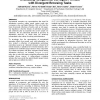Free Online Productivity Tools
i2Speak
i2Symbol
i2OCR
iTex2Img
iWeb2Print
iWeb2Shot
i2Type
iPdf2Split
iPdf2Merge
i2Bopomofo
i2Arabic
i2Style
i2Image
i2PDF
iLatex2Rtf
Sci2ools
107
click to vote
CHI
2005
ACM
2005
ACM
Evaluating navigational surrogate formats with divergent browsing tasks
Navigational surrogates are representations that stand for information resources within search engine result sets, e-commerce sites, and digital libraries. They also form the basis of personal collections of media, such as web pages. Our hypothesis is that the formats of individual surrogates and collections play an important role in how people use collections. We are particularly interested in processes of information discovery, in which ideas are iteratively reformulated in the context of working with information. To investigate how the representation of navigational surrogates affects how people work with information, we have created a collection of undergraduate psychology curriculum resources in 3 alternative formats: a linear list of textual elements, a spatialized set of textual elements, and a spatialized set of labeled images that have been composited. To evaluate navigation with these surrogate formats during information discovery, we designed divergent browsing tasks, that ...
CHI 2005 | Divergent Browsing Tasks | Human Computer Interaction | Individual Surrogates | Navigational Surrogates |
| Added | 30 Nov 2009 |
| Updated | 30 Nov 2009 |
| Type | Conference |
| Year | 2005 |
| Where | CHI |
| Authors | Andruid Kerne, Steven M. Smith, Hyun Choi, Ross Graeber, Daniel Caruso |
Comments (0)

